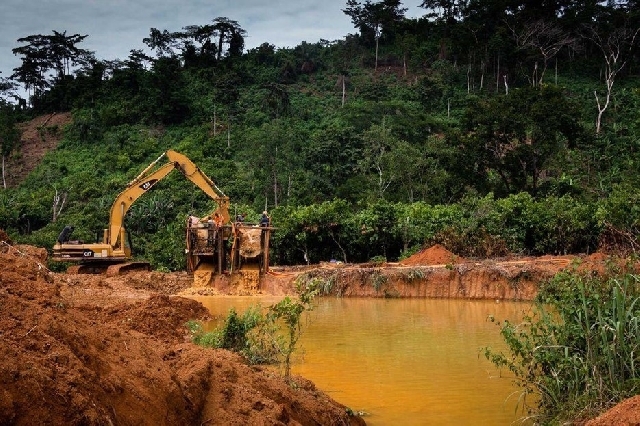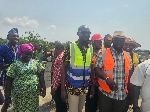Ghana United Nations Association raises alarm over illegal mining crisis, urges immediate action
 Galamsey destroying the land
Galamsey destroying the land
The Ghana United Nations Association (GUNA) has expressed deep concern over the worsening environmental damage caused by illegal mining, locally known as "galamsey," which continues to devastate the country.
In a press release signed by Selaasie Lhal Hiadzi, the Director of Administration, GUNA called for urgent and coordinated efforts from all stakeholders to address the destructive effects of galamsey on Ghana’s environment, economy, and public health.
'Galamsey has become a significant threat to Ghana’s natural resources, leaving widespread environmental degradation in its wake.
The illegal mining activities have led to the destruction of fertile lands, the contamination of major rivers with toxic chemicals such as mercury and cyanide, and deforestation.
These actions have not only disrupted local ecosystems but also pose severe public health risks to communities living near affected areas, the statement said.
According to GUNA, uncontrolled mining operations are having disastrous consequences on agriculture, water supply, and biodiversity.
Large areas of land once used for farming are now barren, severely undermining food security.
Water sources, essential for drinking, fishing, and irrigation, are being polluted, threatening both human health and aquatic life, the statement said.
The use of harmful chemicals in galamsey operations is of particular concern.
Exposure to mercury and other toxic substances has been linked to severe health issues, including neurological damage and birth defects, placing entire communities at risk.
While illegal mining offers short-term financial gains for a few individuals, GUNA warned that the long-term economic consequences are devastating for the country.
The statement noted that the destruction of arable land and polluted water bodies is threatening the agricultural sector, a vital component of Ghana's economy.
This, in turn, undermines sustainable development efforts and jeopardizes the livelihoods of many Ghanaians.
In light of the escalating crisis, GUNA has called on the government, traditional leaders, local communities, civil society organizations, and the private sector to take decisive action. They outlined several key measures, including:
Strengthening Law Enforcement: GUNA urged the government to intensify efforts to enforce environmental laws, prosecute offenders, and dismantle the networks that enable illegal mining.
Promoting Sustainable Mining Practices: The association advocated for the promotion of legal and environmentally friendly mining operations, suggesting that small-scale miners should be supported to obtain licenses and operate within sustainable guidelines.
Community Engagement and Education: GUNA stressed the importance of raising awareness in local communities about the dangers of galamsey and the benefits of environmental protection. They called for communities to be actively involved in efforts to combat illegal mining.
Restoring Degraded Lands: GUNA emphasized the need for a national rehabilitation program to restore lands destroyed by illegal mining. They suggested reforestation projects, soil restoration, and the cleaning of polluted water bodies to revitalize ecosystems and promote sustainable livelihoods.
International Support: The association called on global partners, including the United Nations, to provide technical assistance, funding, and capacity-building initiatives to help Ghana tackle the galamsey crisis.
GUNA concluded by highlighting the urgent need for collaboration across all sectors to combat the growing threat posed by illegal mining. "The environmental degradation caused by galamsey is not just a national issue; it is a crisis that threatens our collective future," the statement said.
Source: Classfmonline.com/Cecil Mensah
Trending News

Central Region NDC secretary disowns circulating statement on security service slots
09:48
Exempt Ghanaians from International English Language Testing System requirement-Ablakwa to UK Commissioner
15:14
PMMC recorded whopping $460 million loss in 2024 under NPP – Agric Minister sets record straight
11:27
Mahama Naser Toure to be laid to rest on January 5
07:53
Ama Mawusi Foundation donates 600 food packs to street children in Greater Accra
16:11
Amasaman MP marks one year in office with constituency project inspection tour
09:40
PMMC made no losses under my leadership – Nana Akwasi Awuah
09:19
Firemen assault: “I was only doing my job” – Journalist narrates attack at Kasoa
10:38
Engineer George Kofi Arthur eyes Western Regional NDC chairmanship
07:47
Jospong Group Chairman spreads New Year cheers with food, cash gifts for over 5,000 Ghanaians
16:06



